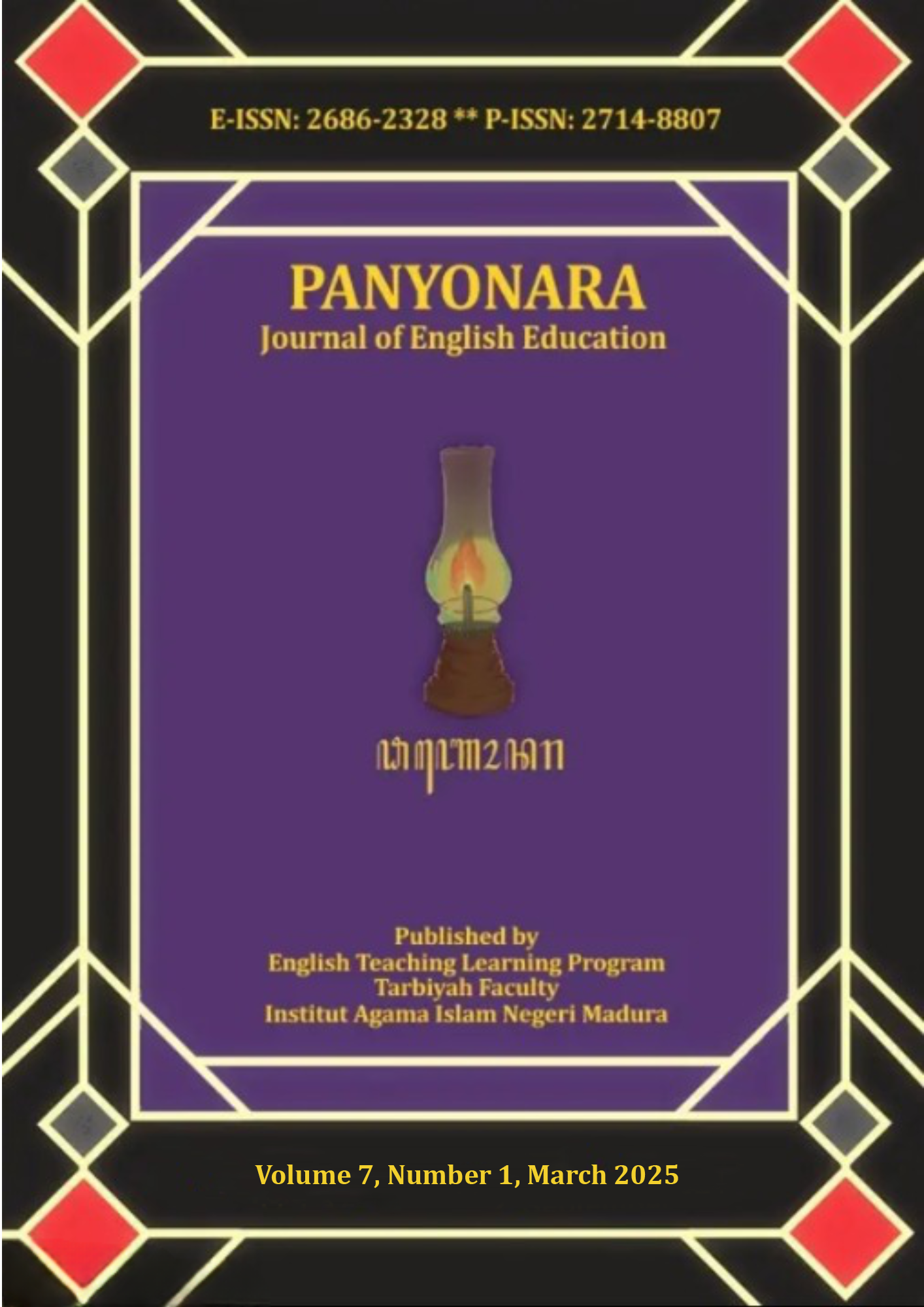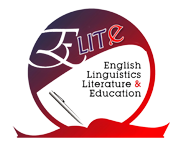The Effect of Tiktok Short Videos towards Students’ Vocabulry Mastery: A Quantitative Research Approach
 Abstract views: 64
,
Abstract views: 64
,
 PDF downloads: 33
PDF downloads: 33
Abstract
TikTok, apart from being an entertainment platform, holds a valuable function as a tool to assist students in acquiring new vocabulary. This study aims to examine the effect of educational videos on TikTok on students' vocabulary mastery. This study employed a quasi-experimental method, involving members of UKM Bahasa at Universitas Islam Negeri Raden Intan Lampung that contained 30 students. To get an appropriate sample, purposive sampling was used. This study used the pre-test and post-test as the instruments to measure students' vocabulary mastery before and after the treatments. The data were analysed by using validity, reliability, normality, and homogeneity tests. Along with that, there was a significant improvement: the average score on the pre-test was 49.96, and the average score on the post-test was 70.2. Additionally, this study successfully found a significant effect between between the use of TikTok educational videos and students’ vocabulary mastery. This highlights TikTok's potential as a useful learning tool.
Downloads
References
Abhi Rama, M., Hamdani, Z., & Prihatini, C. (2023). Students’ Perception On The Use Of Tiktok As An Effective Learning Media In Improving Students’ Vocabulary. Journal on Education, 5(4), 17079–17086. https://doi.org/10.31004/joe.v5i4.4047
Aida, N., Muin, A., & Rohbiah, T. S. (2023). Students ’ English Vocabulary through “ Kate Kulp ” Tiktok Videos. 6(2).
Alek. (2020). Understanding Quantitative Research: A Brief Overview and Process. International Journal of Psychosocial Rehabilitation, 24.
Alqahtani, M. (2015). The importance of vocabulary in language learning and how to be taught. International Journal of Teaching and Education, III(3), 21–34. https://doi.org/10.20472/te.2015.3.3.002
Astrinia Ristama Tampubolon, Basar Lolo Siahaan, & Anita Sitanggang. (2023). The Effect Of Using Tiktok On Students’ Vocabulary Mastery In Seventh Grade At SMP Negeri 9 Pematang Siantar. Jurnal Ilmu Pendidikan Dan Sosial, 2(3), 390–402. https://doi.org/10.58540/jipsi.v2i3.446
Dewa, I. I., Tirtayasa, A., Ngurah, I. G., & Wijaya, A. (2024). The Effectiveness of TikTok as an Instructional Media on Students ’ English Vocabulary Mastery. 5(1), 31–39.
Diana Sarkila, Muhammad Hifdil Islam, & Ririn Fatmawati. (2024). Students Perception On The Use Of Tiktok For Learning Speaking English. Fonologi : Jurnal Ilmuan Bahasa Dan Sastra Inggris, 2(2), 01–14. https://doi.org/10.61132/fonologi.v2i2.577
Efendy, R., Nur, H., Ilham Jaya, M., & Al Ihram, N. (2024). The use of the TikTok application and its effect on students’ learning behavior. Jurnal Inovasi Teknologi Pendidikan, 11(2), 124.
Fabien, Z. P., & Rosario, F.-V. F. (2023). The Use of Digital Tools to improve Students’ Vocabulary. Revista Científica Multidisciplinaria Arbitrada YACHASUN, 7, 18–34.
Heriyanto, D. (2015). Volume 6, Number 1, Februari 2015 Dwi Heriyanto The Effectiveness of Using Youtube for Vocabulary Mastery Dwi Heriyanto. ETERNAL (English Teaching Journal), 6(1), 1–12.
Hukom, S. J. (2021). Board Race Game As an Alternative Strategy in Teaching Vocabulary. Jurnal Tahuri, 18(2), 49–55. https://doi.org/10.30598/tahurivol18issue2page49-55
Language, E., Study, E., Hafid, I., Ghozali, A., Islam, U., Walisongo, N., Rizal, D., Islam, U., & Walisongo, N. (2024). Students’ insights: exploring the impact of kampung inggris lc tiktok account on vocabulary enhancement. 7(1), 95–110.
Lee, Y. (2023). Language Learners ’ Use of Social Media for Informal Language Learning. April.
Liu, P. L. (2016). Mobile english vocabulary learning based on concept-mapping strategy. Language Learning and Technology, 20(3), 128–141.
Lombok, W. (2024). The Effect Of Using Tiktok Videos Toward Students ’ English Vocabulary Mastery At Smp Islam Abhariyah. 1(3), 105–113.
Marlianingsih, N. (2016). Pengenalan Kosa Kata Bahasa Inggris Melalui Media Audio Visual (Animasi) Pada Paud. Faktor Jurnal Ilmiah Kependidikan, 3(2), 133–140.
Mauriza, L., Siregar, N., Muslim, U., & Medan, N. A. (2022). The Analysis of Students’ Vocabulary Mastery Who Are Using Tiktok Application.
Miftachul Taubah, & Muhammad Nur Hadi. (2020). Aplikasi Tik Tok Sebagai Media Pembelajaran Maharah Kalam. Jurnal Mu’allim, 2(1), 57–65. https://doi.org/10.35891/muallim.v2i1.2201
Mota, L., Sorg, I., Cornelis, G., Parsot, C., Bach, S., Stanford, K., McAllister, T., Cheng, H., Jiang, N., & Shen, A. (2005). FEMS Microbiology Letters, 252(1), 1–6.
Nety, N., Syafitri, N., & Ismail, S. R. D. (2023). Perception of Using Tiktok To Improve Vocabulary Mastery on Eleventh Grade Students At Sma Negeri 3 Baubau. English Education Journal, 124, 72–80. https://doi.org/10.55340/e2j.v9i1.1247
Ruth, J., Simanungkalit, M., & Katemba, C. V. (2023). Utilizing English Tiktok As A Media In Learning English Vocabulary : University Students ’ Perspective. 6(2), 137–150.
Sari, S. N., & Aminatun, D. (2021). Students’ Perception on the Use of English Movies To Improve Vocabulary Mastery. Journal of English Language Teaching and Learning, 2(1), 16–22. https://doi.org/10.33365/jeltl.v2i1.757
Skripsi, A., Nurhaliza, P., & Tarbiyah, F. O. F. (2024). The Effectiveness Of Antonio Parlati Tiktok Videos On Students ’ Vocabulary Mastery.
Subekti, A. S. (2023). Pedagogy : Journal of English Language Teaching TikTok and Vocabulary Learning : A Survey Study of Indonesian Students from English Departments. 11(2), 202–216. https://doi.org/10.32332/joelt.v11i2.7866.Journal
Sufi, E. A., & Ningsih, S. K. (2024). @Zelynafah TikTok Videos Influence Vocabulary Mastery Learning Strategies: Followers Perception. Jurnal Pendidikan Guru, 5(1), 6–12.
Suriasmini, N. N. (2024). Tourism Students ’ Perception of Using TikTok in Learning English Vocabulary Mastery. 2(1), 43–50.
Tampubolon, A. R., Siahaan, B. L., & Sitanggang, A. (2024). The Effect Of Using Tiktok On Students ’ Vocabulary Mastery In Seventh Grade At SMP Negeri 9 Pematang Siantar. 2(3). https://doi.org/10.58540/jipsi.v2i3.446
Usman, M., Yoestara, M., Rizal, M., Nurjannah, C., & Mohamed, N. A. (2024). A Study on Enhancing EFL Students’ Vocabulary Proficiency via TikTok. Studies in English Language and Education, 11(3), 1315–1331. https://doi.org/10.24815/siele.v11i3.38472
Utami, P., & Wardani, K. (n.d.). JUNIOR HIGH SCHOOL STUDENTS PERCEPTION TOWARD ENGLISH.
Yoestara, M. (2024). A Study on Enhancing EFL Students ’ Vocabulary Proficiency via TikTok. 11(3).
The journal uses an Open Access policy under a Creative Commons Attribution-NonCommercial 4.0 International License. Authors who publish with this journal agree to the following terms:
- Authors retain copyright and grant the journal right of first publication with the work simultaneously licensed under a Creative Commons Attribution License that allows others to share the work with an acknowledgment of the work's authorship and initial publication in this journal.
- Authors are able to enter into separate, additional contractual arrangements for the non-exclusive distribution of the journal's published version of the work (e.g., post it to an institutional repository or publish it in a book), with an acknowledgment of its initial publication in this journal.
- Authors are permitted and encouraged to post their work online (e.g., in institutional repositories or on their website) prior to and during the submission process, as it can lead to productive exchanges, as well as earlier and greater citation of published work.
















